It’s Suzuki’s latest flagship adventure tourer, and has a solid spec for the price. But how does it go? We spent a fortnight on it round our local roads – here’s what we reckoned to it.
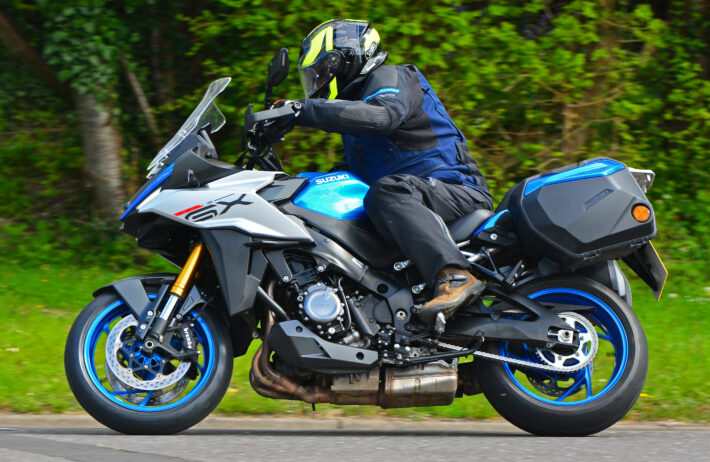
Suzuki is a brand that’s definitely on a bit of an upsurge of late. It had a poor pandemic (didn’t we all…), and just a couple of years ago, its line-up was looking old, tired, and just a little boring.
Where European firms like KTM, Triumph, Ducati and BMW were bringing out loads of slick new machinery, Suzuki was losing legendary bikes like the GSX-R1000, and not really replacing them. Leaving MotoGP a year after winning the bloody thing was another sign of decline. Okay, the mighty Hayabusa got an update in 2021, but the rest of the range needed a serious reboot.
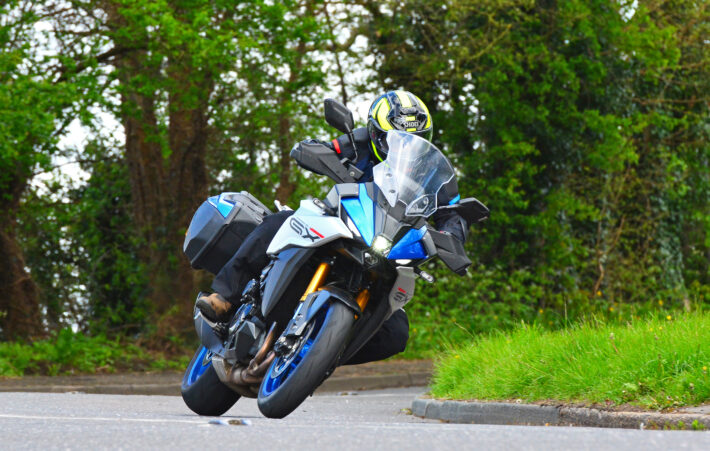
But in the past 18 months or so, the firm has had a proper resurgence, with its new 800 parallel twin engine revitalising its middleweight range – the V-Strom and GSX-8 models. It came up with a corking sport-tourer in the form of the GSX-S1000 GT.
And finally, the R&D department came out with this – an all-new full-sized, full-power adventure tourer, the GSX-S1000 GX. Based around the legendary GSX-R1000 K5 engine – one of the genuinely great powerplants – with a road-biased adventure touring chassis, it’s got a solid spec, high equipment levels and a decent price for that package.
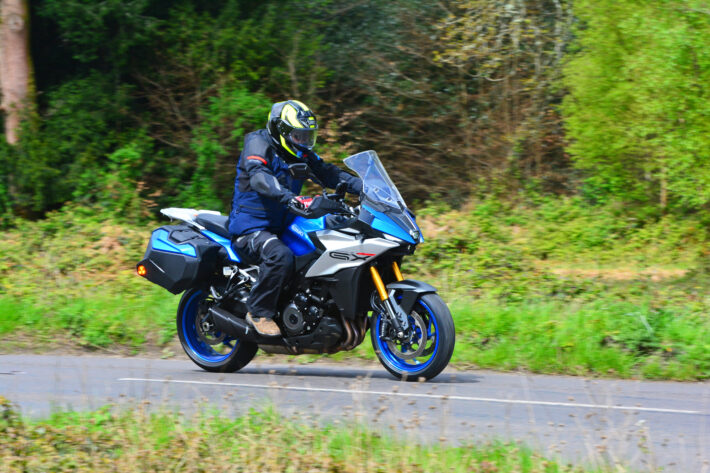
On the face of it, Brand S finally has something to go toe-to-toe with the likes of the Kawasaki Versys 1000, BMW S1000 XR and perhaps even the Ducati Multistrada V4.
And here it is, parked up outside the firm’s Milton Keynes press workshop, ticking over nicely. It’s the highest-spec Suzuki bike ever, with electronic semi-active suspension developed in partnership with Showa at the top of the list.
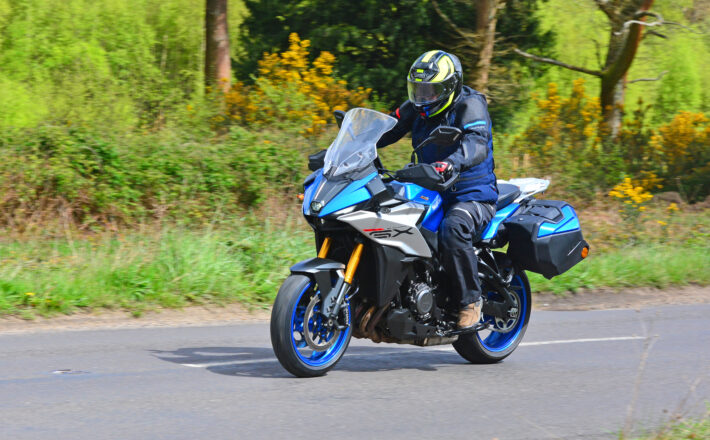
You get a massive 6.5” full colour LCD dash, which lets you control the various rider power modes, traction control settings and cruise control. And there’s also an up/down quickshifter, Bluetooth phone link via a special Suzuki MySpin app, plus a handy USB socket on the side of the dash.
I toss a virtual coin in my head as I leap on board and kick up the sidestand. Do I just head straight back to SW London via the motorways, or go fully cross-country? Or a bit of both?
It’s April, and the weather is still a bit iffy, but I choose the middle way: I head down a winding, fast A-road in the general direction of Aylesbury, letting Google Maps pick up the pieces.
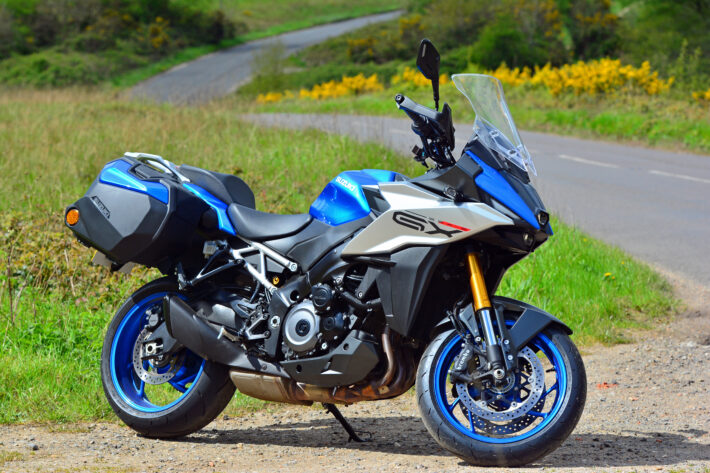
The GX puts you right at your ease straight away: for my 172cm/85kg frame, the rider’s perch is comfy and relaxed. The quickshifter is great in both directions, and there’s stacks of grunt from the rorty four-pot engine below.
It’s a touch on the revvy side compared with some of the competition in this sector – but that’s probably to be expected considering the nature of the donor engine’s roots. It’s by no means weak down low, but there’s a definite rush higher up, that rewards enthusiastic gearchanges (no chore at all with that shifter).
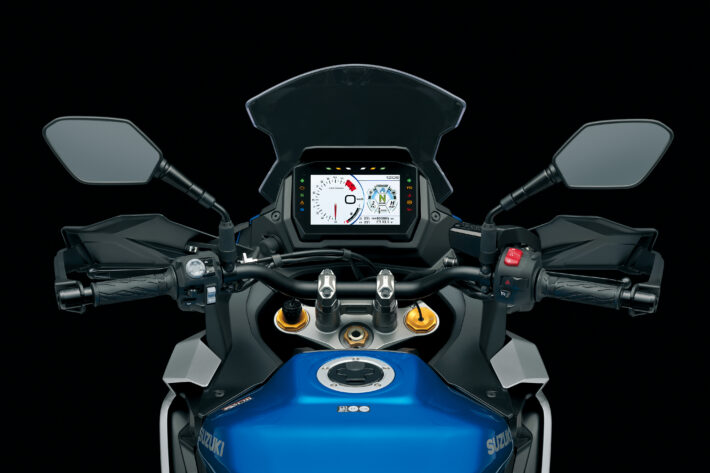
I hit a series of massive HGV-friendly roundabouts and link roads over the M1, and get the chance to try out the GX handling. The brakes should be great on paper, with a pair of Brembo four-piston monobloc radial calipers, but they’re biting on slightly smaller 310mm discs instead of the 320mm or larger seen elsewhere.
The GX isn’t particularly heavy at 232kg wet, but it’s no lightweight either, so you’d think they’d stick with the bigger discs.
Here, they’re a little bit down on outright power and initial bite: no doubt a choice for lazier touring-spec riding, but I’d prefer a more aggressive pad choice, perhaps with that bigger disc size and maybe steel hoses. With 17” wheels, you can fit properly grippy rubber, so there’s definite potential for a sharper experience here.
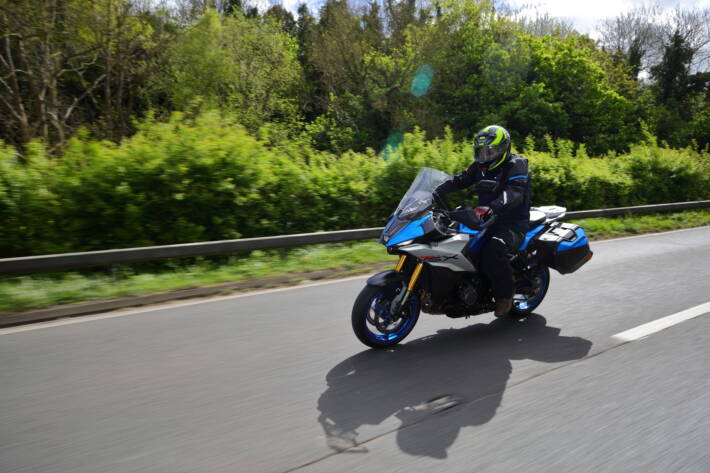
The GX absolutely smashes the slip road onto the gigantic pulsating motorway though. This is very much A Fast Bike, despite its 20-year-old engine design. A hundred and fifty horsepower might not be top of the pile anymore, even on an adventure tourer, but for this particular mid-fifties geezer, it’s still enough to raise an involuntary chuckle.
Give it full gas and full revs, kick up the shifter at the redline, and it’s every bit as invigorating as the old GSX-R1000 superbike range.
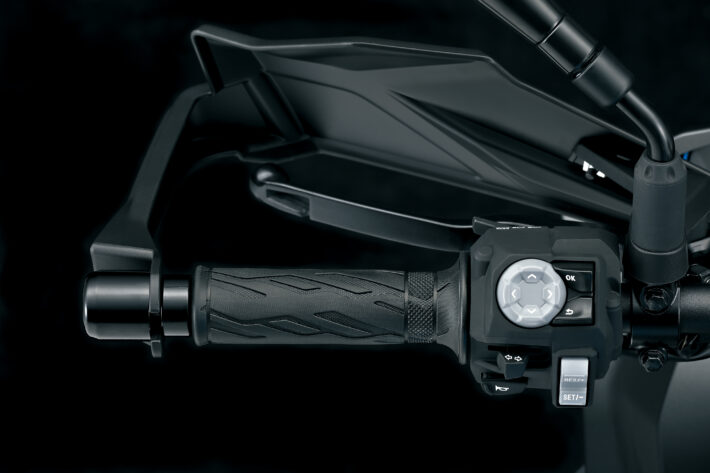
On the busy mid-day M1, the GSX-S is as much a king of the road as any other litre adventure machine. You’re sat up high, with a great view over the cars ahead, most fast-lane dawdlers pull over when they finally notice the Suzuki’s stacked LED lights, and the instant drive means you can nip through an overtake in an instant.
We all know it, but big power is a real safety aid here: the quicker you can get past a car or truck, the less time there is for any mishap or confusion. The cruise control is also easy to use, taking the pressure off on longer jaunts, and is invaluable when you’re in those interminable average speed roadwork zones that festoon the British motorway network these days.
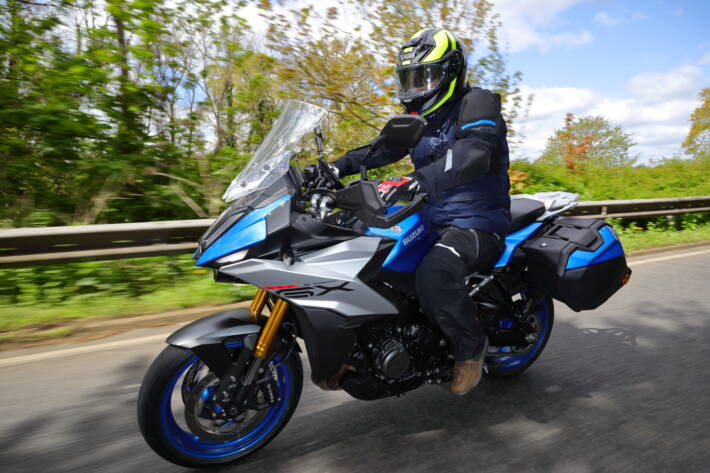
I hit a clear spot for a few miles, and take stock of some of my less obvious surroundings. The mirrors are quite vibey, and once I notice that I try and vary speeds and engine revs, without much success.
Suzuki says it’s used special rubber mountings on both the bars and the mirrors, but they’re still a way off here I’d say, and the view behind suffers. While I’m on a whinge, the screen could be a bit higher: even on the tallest of three positions, I’m getting a bit more wind blast than I’d like (and I’m by no means tall).
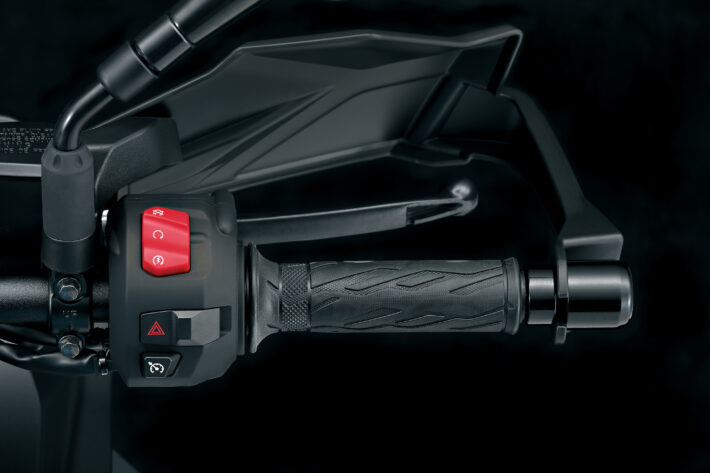
Finally, while the hand guards are doing good work today on this unseasonably-cool spring day, I’d like some heated grips as standard please. No flagship machine should come without them I’d say.
Suddenly, I’m trawling through some bad traffic. The never-ending roadworks around the bottom half of the M25 are doing their worst, and I’m filtering like a deranged courier for five or six miles, until I get to the A3 junction.
Up and off the motorway and onto the A-road, then as the average speed cameras come to an end, I give the GSX-S another handful, and it rorts away with gusto. I’m leaning over a little to change lanes, and suddenly I feel a little bit of movement from the front end.
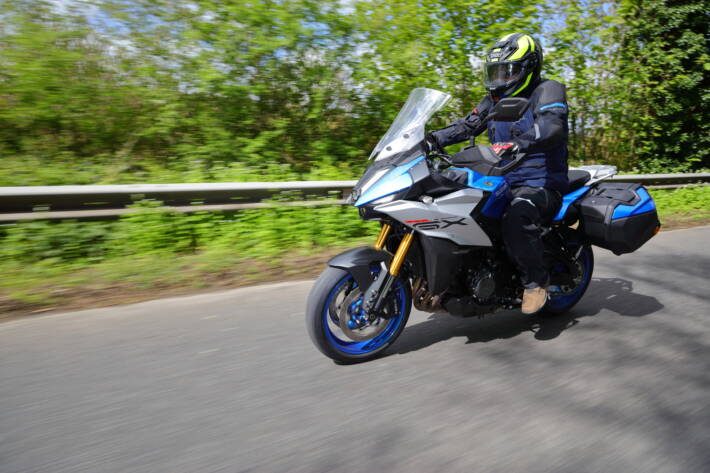
There’s a definite shake of the bars as the weight comes off the front wheel, nothing disconcerting, but a sign that you’re on a pretty lively machine.
And that’s the impression that continues over the next couple of weeks as I ride the fun-packed GSX-S1000 GX around the south-east. It’s not perfect: the stock Dunlop Roadsmart 2 tyres were a little bit squared off, and didn’t feel great on the cool Tarmac where we shot our pictures.
Some fiddling with pressures might help, or an upgrade to a sportier fitment if you’re a more, er, progressive rider. The brakes also underwhelmed a bit throughout the test, in similar fashion to the tyres. They’re more than fine for most conditions, but if you’re wanting to push harder they might want a bit of a fettle.
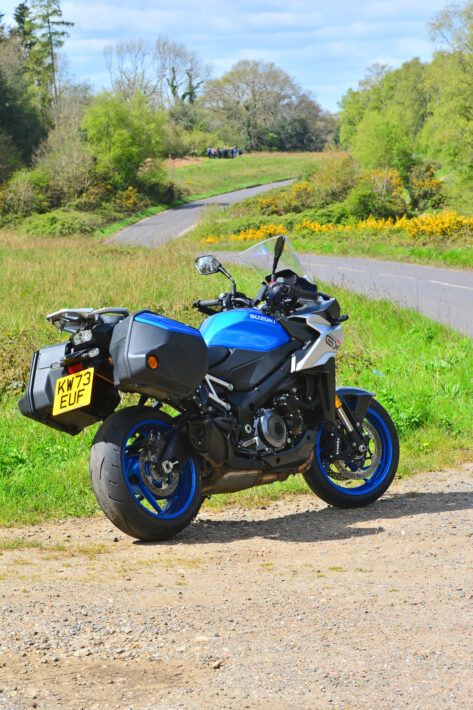
But when it came time to take the GX back to Suzuki HQ, I was most definitely sad to see it go. It was super-easy to live with, thanks to stuff like the 19-litre fuel tank, stock luggage rack and fairly low seat height.
I took one of my kids on the back for a quick run, and they loved it, declaring the grab rail accessible and seat super-comfy. Add on some hard luggage and hot grips, and you’d have a superb touring tool for one or two-up.
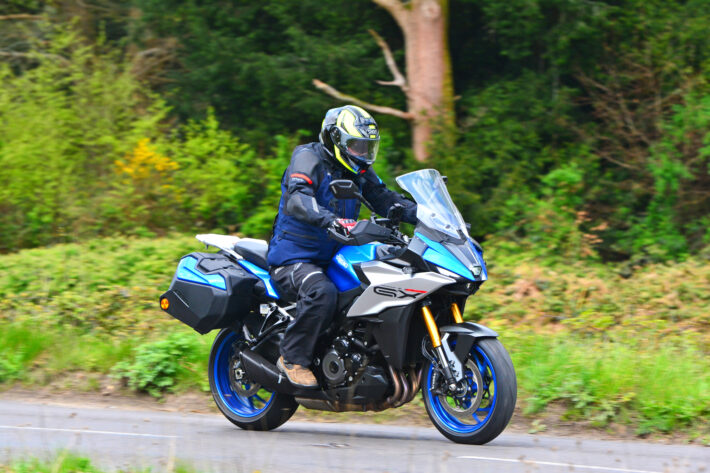
So, full marks to Suzuki for getting its range back on track, especially with the new GSX-S1000 GX. Considering the price (£14,799), the spec and performance is right up there, and it’s a genuinely entertaining ride.
It even looks pretty good I reckon, with its own style and a premium feel which stands up against even the best European options.
Image Credit – John Goodman
SUZUKI GSX-S1000 GX TECHNICAL DETAILS
ENGINE
The GX motor has its roots in the almost-20-year-old GSX-R1000 K5 engine, which is also used for the various GSX-S1000 models and the modern Katana.
It’s a super-conventional design: inline-four cylinder layout, 16-valve DOHC head, liquid cooling, plated cylinders, slipper clutch. It makes 150bhp, which is solid enough for this class, but is a way off exotic options like the BMW M1000 XR and Ducati Multistrada RS.
SUSPENSION
A real highlight, and a first on a Suzuki – the GSX-S1000 GX gets a set of Showa electronically-controlled semi-active suspension. Dubbed the Suzuki Advanced Electronic Suspension (SAES), it uses SHOWA SFF-CATM USD front forks and a BFRC-lite link-type rear shock.
The right hand fork has a stroke sensor inside, with the damping solenoid valve in the left hand fork. The rear shock has two stroke sensors, one for the spring preload position and one for the damping rod, plus an electronically-operated remote hydraulic preload adjuster.
Electric actuators adjust the damping and preload constantly to suit.
All this kit is controlled by an ECU that takes acceleration and position readings from the Inertial Measurement Unit (IMU), as well as speed and other inputs, and responds according to the rider’s chosen suspension mode.
The suspension acts as an anti-dive system on braking too, and also attempts to keep the bike level and balanced when hitting bumps. Finally it stiffens up the suspension at speed to improve stability.
BRAKES
Brembo four-piston calipers up front with 310mm discs and a cornering ABS system.
ELECTRONICS
Rider power modes, cruise control, up/down quickshifter, traction control, and that semi-active electronic suspension system.
EQUIPMENT
Massive 6.5” LCD colour TFT dashboard, standard luggage rack, Bluetooth phone link via a Suzuki app, LED lighting, USB charging socket, three-way adjustable windscreen and standard hand guards.
SPECS
Engine type Four-stroke, four-cylinder, liquid-cooled, DOHC
Bore x stroke 73.4mm x 59.0mm (2.9in. x 2.3in.)
Engine displacement 999cc (61.0 cu. in.)
Compression ratio 12.2 : 1
Maximum power 112kW (152PS)@11,000rpm
Maximum torque 106Nm@9,250rpm
Fuel system Fuel injection
Starter system Electric
Transmission Six-speed constant mesh
Suspension Front Inverted telescopic, coil spring, oil damped
Rear Link type, coil spring, oil damped
Rake / trail 25.5° / 97mm (3.8in.)
Brake Front Disc, twin
Rear Disc
Tyres Front 120/70ZR17M/C (58W), tubeless
Rear 190/50ZR17M/C (73W), tubeless
Fuel tank capacity 19L
Fuel consumption 45.47mpg in WMTC
Wheelbase 1,470mm (57.9in.)
Ground clearance 155mm (6.1in.)
Seat height 845mm (33.3in.)
Kerb mass 232kg (511lbs.)
